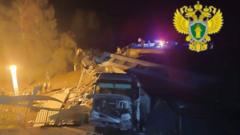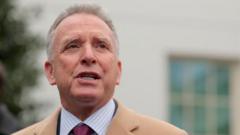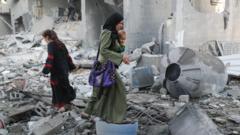**Ukrainian President Volodymyr Zelensky has expressed doubt over Russia's genuine commitment to peace negotiations, ahead of scheduled talks in Istanbul. While Russia is set to participate on Monday, Ukraine emphasizes the need for clarity and readiness to ensure constructive dialogue.**
**Ukraine Questions Russia’s Commitment to Peace Negotiations**

**Ukraine Questions Russia’s Commitment to Peace Negotiations**
**Tensions rise as next round of talks falters amid accusations of insincerity from both sides.**
Ukraine's President Volodymyr Zelensky has cast doubt on Russia's sincerity regarding upcoming peace talks, scheduled to take place in Istanbul on Monday. Despite Moscow's confirmation of its participation, Zelensky raised concerns over the lack of submitted negotiating proposals from the Kremlin, a significant requirement from Kyiv. Kremlin spokesman Dmitry Peskov stated that the conditions for a ceasefire would be a central topic of discussion; however, Zelensky accused Russia of "doing everything it can to ensure the next meeting is fruitless."
"For meaningful talks, there must be a clear agenda and proper preparation," he stated. Ukraine has already presented its own proposals to Russia, reiterating its "readiness for a full and unconditional ceasefire." Previous discussions in Istanbul, held two weeks ago, failed to yield any substantial progress but did result in a prisoner swap.
Since the full-scale invasion began in February 2022, Russia has taken control of approximately 20% of Ukrainian territory, including Crimea, which it annexed in 2014. On Friday, Ukrainian Foreign Minister Andrii Sybiha emphasized that Kyiv's vision for future steps towards peace has been communicated to Moscow, urging acceptance of an unconditional ceasefire to facilitate broader negotiations.
"We are eager for these talks to continue as we aim for the war to conclude this year," he stated during a press conference with Turkish Foreign Minister Hakan Fidan. Although Putin and Zelensky are not expected at the upcoming negotiations, Fidan expressed hope for a future high-level meeting involving the leaders, including efforts from the U.S. The Kremlin mentioned that it would not publicize its ceasefire proposals and would only consider a summit if initial discussions yield favorable results.
Peskov noted that the comments from former President Trump’s envoy to Ukraine, retired General Keith Kellogg, acknowledging Russian concerns over NATO expansion, were welcomed in Moscow. Kellogg had said Ukraine's aspirations to join NATO were not under current consideration, reinforcing the need for continued dialogue.
On May 19, Trump and Putin discussed a ceasefire proposal in a significant phone call, which President Trump described as successful, claiming negotiations for peace would "immediately start." Ukraine has publicly expressed willingness for a 30-day ceasefire; however, Putin has only indicated a desire to work on a "memorandum" regarding potential peace, which has been criticized as merely delaying tactics to allow for further territorial gains by Russia.
Moreover, in an unusual critique of Putin, Trump labeled the Russian leader "absolutely crazy" after recent large-scale attacks on Ukraine, prompting a threat of U.S. sanctions. Meanwhile, Germany’s new Chancellor, Friedrich Merz, reassured Zelensky of Berlin's support in producing long-range missiles to bolster Ukraine’s defenses against Russian aggression. The Kremlin warned that expanding missile capabilities would jeopardize peace efforts and represent a troubling shift in policy.
"For meaningful talks, there must be a clear agenda and proper preparation," he stated. Ukraine has already presented its own proposals to Russia, reiterating its "readiness for a full and unconditional ceasefire." Previous discussions in Istanbul, held two weeks ago, failed to yield any substantial progress but did result in a prisoner swap.
Since the full-scale invasion began in February 2022, Russia has taken control of approximately 20% of Ukrainian territory, including Crimea, which it annexed in 2014. On Friday, Ukrainian Foreign Minister Andrii Sybiha emphasized that Kyiv's vision for future steps towards peace has been communicated to Moscow, urging acceptance of an unconditional ceasefire to facilitate broader negotiations.
"We are eager for these talks to continue as we aim for the war to conclude this year," he stated during a press conference with Turkish Foreign Minister Hakan Fidan. Although Putin and Zelensky are not expected at the upcoming negotiations, Fidan expressed hope for a future high-level meeting involving the leaders, including efforts from the U.S. The Kremlin mentioned that it would not publicize its ceasefire proposals and would only consider a summit if initial discussions yield favorable results.
Peskov noted that the comments from former President Trump’s envoy to Ukraine, retired General Keith Kellogg, acknowledging Russian concerns over NATO expansion, were welcomed in Moscow. Kellogg had said Ukraine's aspirations to join NATO were not under current consideration, reinforcing the need for continued dialogue.
On May 19, Trump and Putin discussed a ceasefire proposal in a significant phone call, which President Trump described as successful, claiming negotiations for peace would "immediately start." Ukraine has publicly expressed willingness for a 30-day ceasefire; however, Putin has only indicated a desire to work on a "memorandum" regarding potential peace, which has been criticized as merely delaying tactics to allow for further territorial gains by Russia.
Moreover, in an unusual critique of Putin, Trump labeled the Russian leader "absolutely crazy" after recent large-scale attacks on Ukraine, prompting a threat of U.S. sanctions. Meanwhile, Germany’s new Chancellor, Friedrich Merz, reassured Zelensky of Berlin's support in producing long-range missiles to bolster Ukraine’s defenses against Russian aggression. The Kremlin warned that expanding missile capabilities would jeopardize peace efforts and represent a troubling shift in policy.




















